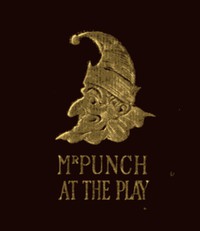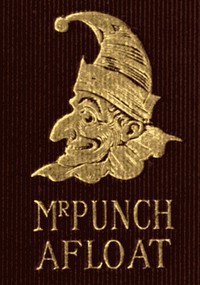Mr. Punch on the Warpath: Humours of the Army, the Navy and the Reserve Forces by - (famous ebook reader TXT) 📗

- Author: -
Book online «Mr. Punch on the Warpath: Humours of the Army, the Navy and the Reserve Forces by - (famous ebook reader TXT) 📗». Author -
7. A village containing one pioneer, one drummer (or bugler) and a quarter-master-sergeant, will be considered fully garrisoned. It will be seen that rules of war are to be followed in every particular,[Pg 94] down to the very smallest details, by all concerned in the campaign.
8. As in the previous series of autumn manœuvres, at least, "five minutes' notice" will be given when the army is required to march five miles, or to perform any other military duty requiring zeal, steadiness, and an intimate acquaintance with "Field Exercises, Edition of 1874, Part I."
Solved at Last.Jawkins. Why do they always call sailors "tars"?
Pawkins.—Because they're so accustomed to the pitching of the ship.
[Pg 89]
Bluejacket (who has been hauled twice round the sick bay, yelling inarticulately, by the surgeon with the forceps). "Why, you 'ad me by the tongue!"
[Pg 90]
Irritable Captain. "Your barrel's disgracefully dirty, sir, and it's not the first time; I've a good mind to——"
Private Flannigan. "Shure, sor, I niver——" Captain (Irish too). "Silence, sir, when you spake to an officer!"
[Pg 91]
Officer in charge of battery (in a fever lest the time of firing should be a second late). "Why, what are you about, No. 6? Why don't you serve the sponge?"
Bombardier McGuttle. "Hoots toots! Can na' a body blaw their nose?"
[Pg 93]
Instructor. "Well, gentlemen, I have endeavoured to explain to you the theoretical principles governing the movements of the various portions of a combined force; but I must warn you, that, in practice on an ordinary field-day, you will probably find it result in hopeless confusion; while on active service it will be ten times worse!"
[Pg 95]
Volunteer Colonel (swell brewer). "I'm afraid, Mr. Jenkins, you had been indulging in potations that were too strong for you!"
[Private J. was being "called over the coals" for insubordination at the inspection.
Private Jenkins (who is still wearing his bayonet on the wrong side). "Oh, I couldn't have been drunk, sir, for I never had no more than one pint o' your ale all the blessed day!"
[Pg 96]
Register-keeper. "Major Jones first to count. A miss—nothing."
Major Jones. "I say, sergeant, that's almost an Irish bull, I fancy!"
Register-keeper. "No, sorr, just a simple English miss!"
[Pg 97]
Sergeant Major. "Number three, where's your sword?"
Recruit (who finds practice very different from theory). "On the ground. Carn't see 'un?"
[Pg 98]
MILITARY DIALOGUES IArmy Reform
Scene.—The drawing-room of the Colonel's quarters, decorated with trophies from many lands and water-colour sketches. Mrs. Bulkwise, the Colonel's wife, a tall, broad and assertive lady, is giving tea to Mrs. Lyttleton-Cartwright, with the stamp of fashion upon her, and Mrs. Karmadine, who has a soul for art—both ladies of the regiment. Colonel Bulkwise, a small and despondent man whose hair is "part-worn" gazes morosely into the fire.
Mrs. Bulkwise (waving a tea cup). As surely as woman is asserting her right to a place in medicine, in law, and in the council, so surely will she take her proper place in the control of the army.
Mrs. Lyttleton-Cartwright. What a lovely costume one could compose out of the uniform. I've often tried Jack's tunic on.
Mrs. B. (severely). The mere brutal work of fighting, the butchery of the trade, would still have to be left to the men; but such matters as require higher intelligence, keener wit, tact, perseverance, should be, and some day shall be, in our hands.
Mrs. Karmadine. And the beauty and grace of life, Mrs. Bulkwise. Surely we women, if allowed, could in peace bring culture to the barrack-room, and garland the sword with bay wreaths?
Mrs. B. Take the War Office. I am told that the ranks of the regiments are depleted of combatant officers in order that they may sit in offices in Pall Mall, and do clerical work indifferently. Now, I hold that our sex could do this work better, more cheaply, and with greater dispatch.[Pg 102]
Mrs. L.-C. "Pall-Mall" would be such an excellent address.
Mrs. B. The young men, both officers and civilians, who are employed waste, so I understand, the time of the public by going out to lunch at clubs and frequently pause in their work to smoke cigars and discuss the odds. Now a glass of milk, or some claret and lemonade, a slice of seed-cake, or some tartlets, brought by a maid from the nearest A. B. C. shop would satisfy all our mid-day wants.
Mrs. L.-C. And I never knew a woman who couldn't work and talk bonnets at the same time.
Mrs. C. Just a few palms—don't you think, Mrs. Bulkwise?—in those dreary, dreary rooms, and some oriental rugs on the floors, and a little bunch of flowers on each desk would make life so much easier to live.
[Colonel Bulkwise murmurs something unintelligible.
Mrs. B. What do you say, George?
Colonel B. (with sudden fierceness). I said, that there are too many old women, as it is, in the War Office.[Pg 104]
Mrs. B. George!
[The colonel relapses again into morose silence.
Mrs. B. The Intelligence Department should, of course, be in our hands.
Mrs. L.-C. I should just love to run about all the time, finding out other people's secrets.
Mrs. B. And the Clothing Department calls for a woman's knowledge. The hideous snuff-coloured garments must be retained for warfare, but with the new costume for walking out and ceremonial I think something might be done.
Mrs. L.-C. The woman who makes my frocks is as clever as she can be, and always has her head full of ideas for those sort of things.
Mrs. C. Michel Angelo did not disdain to design the uniform of the Swiss Guard. Perhaps Gilbert, or Ford, or Brock might follow in the giant's footsteps.
Col. B. You ladies always design such sensible clothes for yourselves, do you not?
[He is frozen into silence again.
Mrs. B. And the education of young officers. From a cursory glance through my husband's books on law, topography and administration, I[Pg 106] should say that there are no military subjects that the average woman could not master in a fortnight. Strategy, of course, comes to us by intuition. The companionship and influence of really good women on youths and young men cannot be over-rated, and the professors both at the Staff College and at the Military Academy should be of our sex.
Mrs. L.-C. I always love the boys; but I think some of the staff college men are awfully stuck up.
Mrs. B. Now as to the regiment. The mess, of course, should be in our province.
Mrs. L.-C. How ripping. The guest-nights would be lovely dinner parties, the ante-room we'd use for tea, and the band should always play from 5 to 6. We'd have afternoon dances every Thursday, and turn the men out once a week and have a dinner all to ourselves to talk scandal.
[The colonel groans.
[Pg 99]
Volunteer Captain. "Ah, Sergeant Jones—didn't I send you an order to be at headquarters on Monday, at nine o'clock, with a corporal and six men for duty?"
Sergeant. "Yes, sir. But I think if there was a little more 'request', and a little less 'order', it would be (a-hem)—better!"
[Pg 100]
(The property of the British nation.)
[Pg 101]
["Coronation Claims.—There being no succession to certain offices, the appointment thereto rests with His Majesty, and the following are regarded as probable candidates:—Lord High Constable—The Earl Roberts," &c.—Vide Daily Mail, Nov. 19, 1901.]
[Pg 103]
"Curious way that boy has of salutin'. Don't believe it's correct!"
[Pg 105]
The Gallant Major. "I beg a thousand pardons for the apparent liberty I take as an entire stranger, but may I make so bold as to ask you, is not this one of that wonderful breed of black or Chinese pugs?"
The Pretty Lady (most condescendingly). "Yes, you are perfectly right, and if I am not mistaken, you are Major McBride, of the Ninety-ninth Hussars."
[From that moment they became fast friends, and within the next three months there appeared in the "Morning Post," 'A marriage has been arranged between Major McBride, of the Ninety-ninth Hussars, and Mrs. Bellairs,' &c., &c.
[Pg 107]
Imperial Yeoman. "Much obliged if you would pick up my sword for me."
[Pg 108]
["It has been decreed in several line battalions that in future no soldier will be allowed to walk arm-in-arm in the street with a female."—Daily Paper.]
[Pg 109]
"Oh! I say! 'E 'as got eyes after all!"
[Pg 110]
Doctor. "Don't feel well, eh? Appetite all right?"
Tommie. "Eat like a wolf, sir."
Doctor. "Sleep well?"
Tommie. "As sound as a dog, sir."
Doctor. "Oh, you'd better see the vet.!"
[Pg 111]
Lubber. "I say, Jack, do you know why they've painted the ships grey in time of peace?"
Jack. "I s'pose 'cos it's a neutral tint!"
[But the other didn't laugh. He intended making that witticism himself.
[Pg 112]
"I say, why am I like the Queen's chief cook? Do you give it up?"
"Yes."
"Because I am in a high cool-and-airy (culinary) position."
[Astonished cadet nearly falls from the yard.
You young monkey, how dare you joke up in the air like that? However, we look over it this time.—Punch]
[Pg 113]
1. Never recognise your enemy when you meet him on the road, in case you might be compelled to take him prisoner and so cause unpleasantness and unseemly disturbance.
2. Advanced guards should walk quietly and without ostentation into the enemy's main body, and be careful never to look behind bushes, trees, or buildings for an unobtrusive cyclist patrol. To do so might cause the enemy annoyance.[Pg 114]
3. An advance guard, if surrounded, will surrender without noise or alarm. To make any would disturb the main body, who like to march in a compact and regular formation.
4. Never allow your common-sense to overcome your natural modesty so far as to induce you to report to a superior officer the presence of the enemy in force. You will only acquire a reputation for officiousness by doing so.
5. Always attack an enemy in front. It is unsportsmanlike and unprofessional to attack the flanks.
6. When retiring before an attack maintain as close a formation as the ground will admit of, and retire directly upon the main infantry support. You will thus expose yourselves to the fire of both your own friends and the enemy, and as blank cartridge hurts nobody it will add to the excitement of the operation.
7. It is more important to roll your cloaks and burnish your bits than to worry about unimportant details of minor tactics.
8. Since a solitary horseman never attracts the enemy's attention, be careful





Comments (0)